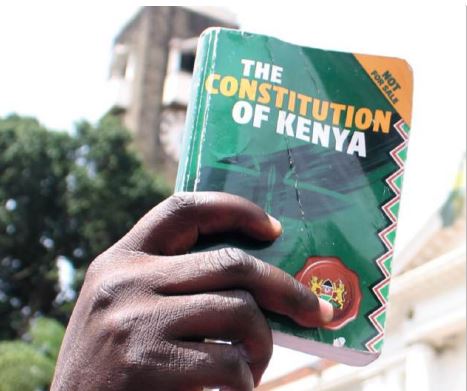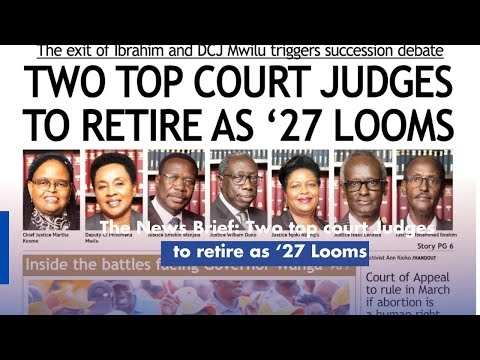
 A Kenya constitution booklet /FILE
A Kenya constitution booklet /FILE
This may become an occasional
series about the constitution and public money.
Like people, the state collects money, keeps money (hopefully safely) and uses (spends) money ¾ having, one hopes, decided sensibly how to spend it.
Getting money
Money may come into the public purse in a variety of ways. Taxes come first to mind. Then the possibility of charging for services or goods ¾ including perhaps rent from tenants of government land. Again, like human beings, it may borrow money ¾ which of course means that eventually the loan will have to be repai,d almost certainly with interest, so more goes out than has come in.
The state may receive gifts (often called grants, and often with strings attached and must be used for a specified purpose. Government might also earn interest on some investment, or even dividends in shares if it owns them in a company. Individuals may earn money (though more likely lose it) by gambling. It is hard to see how a government could legitimately gamble in the same way — although it is common to hear government plans described as “gambles”.
My generation of lawyers probably only learnt one thing as students about the constitution and tax: that tax had to be approved by Parliament.
Provisions may affect tax
Various constitutional provisions that do not mention tax may have an important impact on governments’ ability to tax. Some would affect what taxes government raises, while others would be relevant to how government raises them, and some to the amount.
Among the national values and principles (Article 10), participation, human dignity, equity, social justice, transparency, accountability and sustainable development are all relevant. Human rights are also relevant — especially equality and non-discrimination.
“Tax” or a related word (taxation or taxes) appears specifically 19 times in the constitution.
So what is the intended impact of the constitution on taxation?
National or county?
Only the national government may impose income tax; value added tax (which may be imposed to take some of the additional value added for someone by something like processing of goods or by services; taxes (called “duties”) on goods imported or exported; and excise tax (which under Kenyan law is imposed on alcohol and gambling and on a very wide variety of other goods and activities not necessarily in the “sin category”).
Only counties may impose property (land) rates and entertainment taxes. A 1951 national Entertainments Tax Act must now be unconstitutional.
Any of these taxes must be imposed by law (one of the achievements of historical democratic struggles was to establish that kings could not impose taxes).
Parliament may add to the taxing powers of counties and national governments (but not if the other level has exclusive powers). And in the case of counties, an individual county would decide whether to use the new taxing powers.
It is clear that some counties have imposed taxes beyond their powers, including by cess. Counties are also told that their revenue raising law must not affect national economic policy or inter-county economic activity or national mobility of goods and services. Cess on goods passing through a county also clearly offends the latter.
There have been cases of counties trying to use their power to tax things that would not fall into a reasonable definition of entertainment, including gambling proceeds (Nairobi) and staying at a hotel or guest house (Kwale).
The process
Like other law making, tax law requires public participation and various county laws have been declared unconstitutional for this reason, meaning lack of meaningful public input. The national 2023 Finance Act was held unconstitutional for this reason — but the Supreme Court reversed that aspect of the case.
Equality and equity
Non-discrimination is a human right, so any tax that varies according to people’s personal characteristics (like gender, age, ethnicity, place or birth, etc.) would be unconstitutional unless there was good reason within Article 24 for the discrimination.
Equality, though, does not mean treating everyone identically. It is clear that one object of government policies must be to achieve greater equality. Article 201 says that the burden of taxation must be shared fairly. “Fairness” should be looked at in the light of the national values and Article 27 on equality. Taxation can be an important tool of wealth redistribution — to achieve fairness in society. I suggest that this has constitutional support in Kenya. The Kenya tax policy recognises reduction as a possible objective for governments but does not otherwise discuss it, though it does mention fairness a lot.
The Institute of Economic Affairs has said that in various ways Kenya’s tax system is unfair. For example, “someone earning Sh400,000 annually faces the same 30 per cent rate as someone earning Sh9,000,000, disproportionately impacting the lower earner.” And there is no rate higher than 35 per cent here (the highest rate in South Africa is 45 per cent).
Transparency
Do you have any idea how much tax you pay?
Laws and policies may be more or less understandable to citizens. It is argued that if people understand how much they are taxed and why, then they will be more prepared to pay. This is less convincing when people understand from government itself that a large slice of what they pay will be lost to corruption. But the argument of fairness still applies— and transparency is essential for true accountability — another national value.
Transparency involves using language that is clear, but creating situations that are clear too.
I suggest that the number of “levies” obscures the true situation of taxation in Kenya. Levies are raised for specific departments of government, and are intended to be used by them. But the real payers are ultimately the people who use the services provided by the government department.
What is tax?
I have left this until last because it is important to realise why the meaning of a word matters before you start to interpret it.
The main difference between a tax and some other sort of payment is that for a fee or a charge you usually get something in return — goods, or a right — perhaps to do business. You get nothing specific in return for a tax.
However, suppose you get something in return, but in reality, the price is far above the value of what you get in return? Such payments can be really taxes – and courts in some countries have held this. In the UK, the national office of statistics counts them as taxes.
You can see how a trick like this could be used by counties to impose taxes in the guise of prices for something.
Another factor in taxes is that they are compulsory. But how about NSSF? That is compulsory but you are supposed to get back what you put in when you retire — in fact, more because of the employer’s contribution and interest over the years. So it is said not to be tax.
The housing levy, on the other hand, is clearly a tax — you must pay it but you are not, under the law now, guaranteed anything because of it. It must meet constitutional standards. These include not exempting people from payment without good cause. A tax is not necessarily called “tax”.
How about SHIF? There is partial income tax relief for those paying into the Social Health Insurance Fund (SHIF), which is supposed to be everyone — it is compulsory. If you have not paid, you do not get the benefit — which makes it look like a charge (or an insurance contribution). In Germany, health insurance is compulsory but tax deductible, but not tax.
I would argue that, if a payment is compulsory, even if it is not clearly a tax, the general principles of the constitution mean that it must be fair. Fair in the amount charged, fair as a compulsory charge, and fair in terms of the benefits you get, including that the “same” is not necessarily fair.
Jill Cottrell Ghai is the director Katiba Institute

















